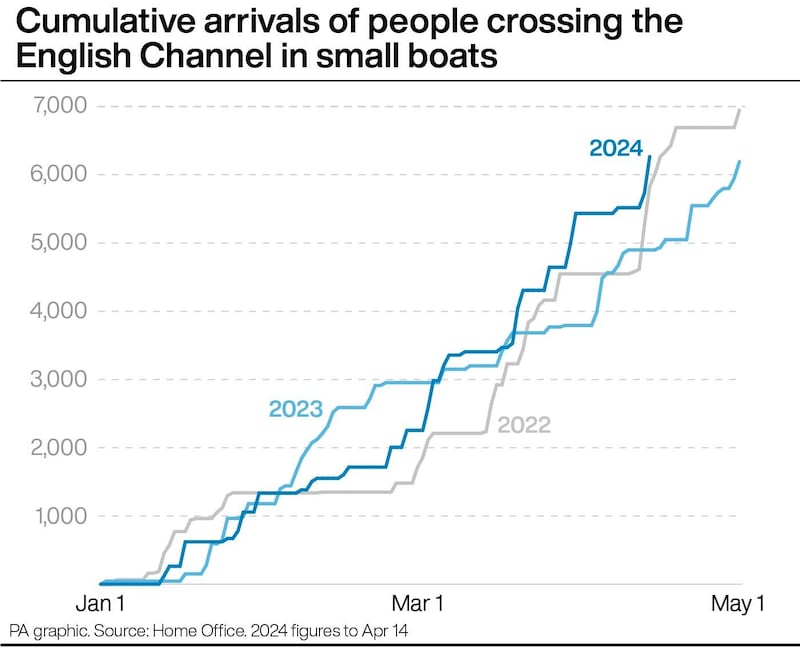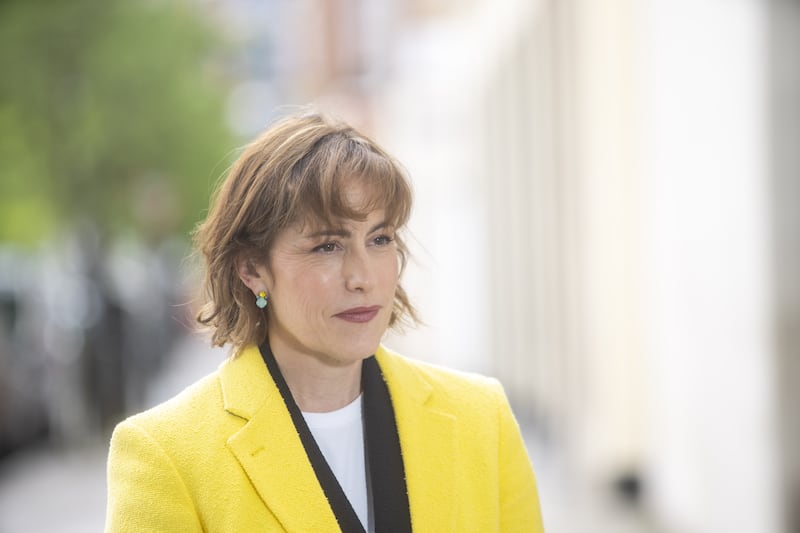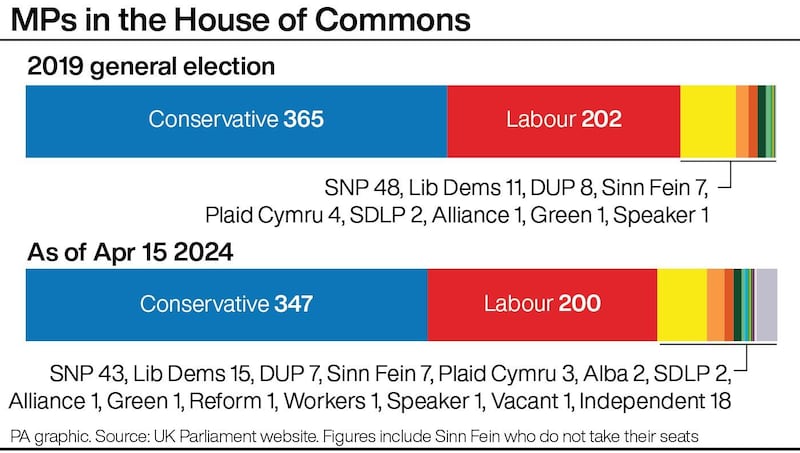Rishi Sunak is braced for a fresh round of parliamentary wrangling over his Bill to save the Government’s stalled Rwanda deportation scheme, as MPs and peers head back to Westminster this week.
The Commons returns from Easter recess on Monday with the legislation high on the agenda after a minister insisted flights carrying asylum seekers to Kigali should be taking off “within weeks”.
It comes as Sunday became the busiest day yet for Channel crossings so far this year after more than 500 migrants arrived in the UK in a single day.

It means some 6,000 people have made the journey in 2024 to date, with more than 75,000 arrivals recorded two years on from the Rwanda deal being signed.
MPs will consider amendments to the Safety of Rwanda Bill by the House of Lords, which inflicted a series of defeats against the controversial policy before rising for the spring break.
The Government will seek to strip out changes made by peers who want extra legal safeguards, including a provision to ensure “due regard” for domestic and international law.
Health Secretary Victoria Atkins suggested on Sunday the Home Office is “ready to go” in implementing the plan when the Bill gets on to the statute books.
The legislation seeks to revive the Government’s plan to send some asylum seekers on a one-way flight to Kigali, which has faced a series of setbacks since it was announced two years ago by then-prime minister Boris Johnson.

It declares the east African country is safe after the policy was grounded by the Supreme Court ruling the scheme was unlawful.
Meanwhile, the Times reported on Monday that Britain had also approached countries including Costa Rica, Armenia, Ivory Coast and Botswana a bid to replicate the scheme, which is set to cost at least £290 million, elsewhere.
The UK is in talks with the nations after Mr Sunak gave the Home Office and Foreign Office a deadline of last autumn to secure two additional deals, according to the paper.
A Government spokesperson said Britain is “continuing to work with a range of international partners to tackle global illegal migration challenges”.
They said: “Our focus right now is passing the Safety of Rwanda Bill, which builds on the Illegal Migration Act, and putting plans in place to get flights off the ground as soon as possible.”
Home Office permanent secretary Matthew Rycroft said only a “tiny number” of countries were suitable for a Rwanda-style scheme, telling the Public Accounts Committee on Monday afternoon: “A lot have been assessed and a tiny number are into the next stages of work.”
Appearing before MPs, Mr Rycroft indicated officials were seeking a drop in migrant crossings of about 10,000 people once the policy was in force in order to consider it value for money.
The Home Office said 534 migrants were recorded crossing the Channel on Sunday in 10 boats. This is the highest daily total on record since the start of the year and suggests there was an average of around 53 people on each boat.
The latest crossings take the provisional total for the year so far to 6,265 – 28% higher than this time last year (4,899) and 7% higher than the 5,828 recorded at this point in 2022.
PA news agency analysis of the figures suggests 75,629 migrants have made the journey since then home secretary Priti Patel signed what she called a “world-first” agreement in Rwanda’s capital Kigali on April 14 2022, with 43,328 taking place since Rishi Sunak became Prime Minister six months later.
The “unacceptable” number of migrants crossing the Channel on Sunday demonstrated the need for the Government’s Rwanda Bill to pass because of the “important deterrent” it will provide, Downing Street said as it urged parliamentarians to “unite behind” the proposed laws.
Asked whether the Prime Minister believes he is succeeding in his pledge to stop the boats, Mr Sunak’s official spokesman said: “Clearly we’ve made progress.” But he added there is “much more to do and that is exactly why the PM’s message is so clear that we must pass this Bill in order to get flights off the ground”.
The spokesman insisted the Government was still committed to getting flights off the ground “as soon as possible” when repeatedly pressed on when this will happen and whether the previously promised timeline of them taking place in the spring could slip.
Charity Freedom from Torture said it was “utterly shameful” to see MPs continue to vote down “vital” Lords amendments, adding: “We urgently need the Government to abandon this cruel ‘cash for humans’ deal once and for all and get on with the job at hand – restoring the right to asylum in the UK and clearing the backlog, so that those currently stuck in limbo can recover and rebuild their lives.”

Peers are expected to mull the Rwanda Bill on Tuesday and could then send it back to the Commons with amendments later in the week, prolonging the process known as parliamentary ping-pong where legislation is batted between the two Houses.
It is one of two significant parliamentary battles the Prime Minister faces this week, along with a crunch vote on his flagship smoking policy that will be seen as a test of his personal legacy.
The plans would restrict the sale of tobacco so that anyone turning 15 this year, or younger, will never legally be sold cigarettes.
Labour has backed the proposals, though they have faced criticism from some free-marketeering Tory MPs including Mr Sunak’s predecessor Liz Truss.
The policy is expected to be put to a free vote when it comes to the Commons for a debate on Tuesday.








